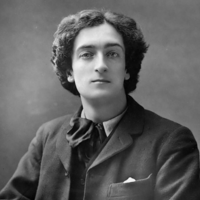Faery Gold
(TO MRS. PERCY DEARMER)
A poet hungered, as well he might–
Not a morsel since yesternight!
And sad he grew—good reason why—
For the poet had nought wherewith to buy.
‘Are not two sparrows sold,’ he cried,
‘Sold for a farthing? and,’ he sighed,
As he pushed his morning post away,
‘Are not two sonnets more than they?’
Yet store of gold, great store had he,-
Of the gold that is known as ‘faery.’
He had the gold of his burning dreams,
He had his golden rhymes-in reams,
He had the strings of his golden lyre,
And his own was that golden west on fire.
But the poet knew his world too well
To dream that such would buy or sell.
He had his poets, ‘pure gold,’ he said,
But the man at the bookstall shook his head,
And offered a grudging half-a-crown
For the five the poet had brought him down.
Ah, what a world we are in! we sigh,
Where a lunch costs more than a Keats can buy,
And even Shakespeare’s hallowed line
Falls short of the requisite sum to dine.
Yet other gold had the poet got,
For see from that grey-blue Gouda pot
Three golden tulips spouting flame–
From his love, from his love, this morn, they came.
His love he loved even more than fame.
Three golden tulips thrice more fair
Than other golden tulips were–
‘And yet,’ he smiled as he took one up,
And feasted on its yellow cup,-
‘I wonder how many eggs you’d buy!
By Bacchus, I’ve half a mind to try!
‘One golden bloom for one golden yolk–
Nay, on my word, sir, I mean no joke–
Gold for gold is fair dealing, sir.’
Think of the grocer gaping there!
Or the baker, if I went and said,
-'This tulip for a loaf of bread,
God’s beauty for your kneaded grain;’
Or the vintner-'For this flower of mine
A flagon, pray, of yellow wine,
And you shall keep the change for gain.’
Ah me, on what a different earth
I and these fellows had our birth,
Strange that these golden things should be
For them so poor, so rich for me.’
Ended his sigh, the poet searched his shelf–
Seeking another poet to feed himself;
Then sadly went, and, full of shame and grief,
Sold his last Swinburne for a plate of beef.
Thus poets too, to fill the hungry maw,
Must eat each other-'tis the eternal law.

